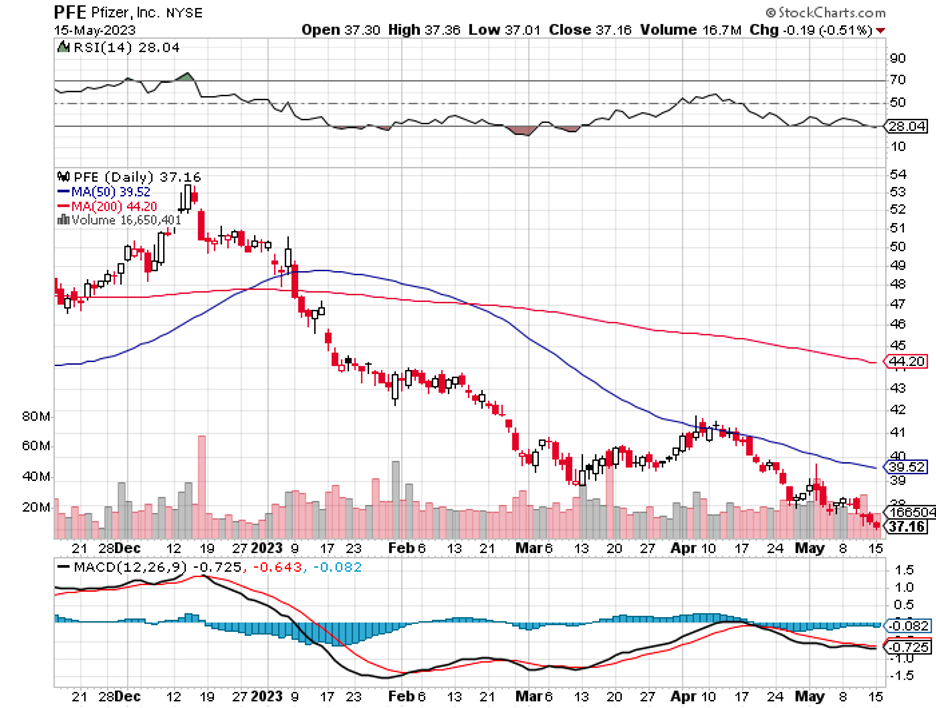From Pandemic Hero to Underrated Stock Star
For investors grappling with the classic dilemma of whether to jump into the stock market or wait for a market dip, here’s a compelling solution: healthcare stocks.
These stocks offer the best of both worlds, combining elements of both defensive and growth investments, providing a potential way out of this conundrum.
The defensive nature of healthcare stocks was vividly displayed in 2022, when the Health Care Select Sector SPDR exchange-traded fund (XLV) only saw a minimal decline of 2.1%, significantly outperforming the broader market's 18% slump.
This resilience stems from a simple truth: regardless of economic conditions, people will always require medical care and medications. As a result, healthcare companies tend to experience less volatility in terms of revenue and earnings compared to the overall market.
However, this year has been a different story. Technology and communication services shares have taken the lead, causing healthcare stocks to dip by 2.3%. Meanwhile, the S&P 500 has surged by 8.4% as investors view healthcare as a defensive sector.
Nonetheless, don't overlook the significant growth potential in this sector. In fact, healthcare has consistently delivered an average annual earnings growth rate of 12% since the mid-1980s, surpassing even the tech sector.
This impressive growth has been driven by factors such as aging populations in developed countries, the rising affluence of consumers in emerging markets, and groundbreaking advancements in the treatment of previously incurable conditions.
Interestingly, the recent decline in healthcare stocks has made their valuations more attractive. Currently, healthcare trades at a 5% discount compared to the broader S&P 500, whereas historically it has commanded a premium of around 11%.
Considering this, it's evident that the fundamental outlook for healthcare remains promising, making it an enticing opportunity for investors.
In the realm of defensive downside protection combined with compelling long-term growth prospects, a few notable companies shine brightly.
One standout is Pfizer (PFE), the pharmaceutical titan that truly hit it out of the park during the tumultuous COVID-19 pandemic.
Not only did it swiftly develop and commercialize its highly successful vaccine in collaboration with BioNTech (BNTX), but it also demonstrated an innovative approach that can be leveraged for future drug and vaccine advancements.
The COVID-19 vaccine proved to be an extraordinary cash cow for Pfizer, catapulting their revenue in 2021 and 2022 to double the figures of the previous two years.
Meanwhile, their free cash flow nearly tripled, presenting the company with abundant financial opportunities.
When we examine Pfizer in comparison to its US Big Pharma counterparts like Johnson & Johnson (JNJ), Eli Lilly (LLY), Merck & Co (MRK), AbbVie (ABBV), Bristol Myers Squibb (BMY), Amgen (AMGN), and Gilead Sciences (GILD), though, it becomes evident that this stock is appearing significantly undervalued across various metrics.
A fascinating observation emerges when we consider that Pfizer's revenue in 2022 was 3.5 times higher than that of Eli Lilly, yet Pfizer's market capitalization is $150 billion lower than Lilly's.
Furthermore, Pfizer surpassed Merck and AbbVie in revenue by nearly 2 times while achieving a substantially higher profit margin.
Still, Pfizer's market capitalization of $220 billion is nearly $50 billion lower than AbbVie's and approximately $70 billion lower than Merck's.
These comparisons suggest that Pfizer's stock price is curiously undervalued, presenting an opportunity for growth. However, the market has arrived at a different conclusion.
The rationale behind this perspective lies in the belief that the additional revenues generated by Pfizer through Paxlovid and Comirnaty due to the COVID-19 pandemic are not expected to be a permanent fixture.
As fewer individuals receive COVID vaccinations and require antiviral treatments, the demand for these products is predicted to decrease significantly. Consequently, this perceived compromise in Pfizer's growth trajectory has influenced its valuation in the market.
Moreover, several moneymaking drugs are set to lose patent exclusivity, which again underlines why analysts and the market are reluctant to buy the company's stock.
Rather than opting for a special dividend or engaging in additional stock buybacks, Pfizer's management embarked on an impressive acquisition spree, replenishing the company's drug development pipeline.
Pfizer has been making major moves in the pharmaceutical industry since mid-2021.
In a series of high-profile acquisitions, the company has added some promising drug candidates to its already impressive portfolio. In fact, Pfizer is aiming to generate $20 billion in revenues from its product pipeline by 2030, while adding another $25 billion to the top line through business development.
Some of the notable deals completed by Pfizer include the $2.3 billion acquisition of Trillium Therapeutics, which brought in two CD-47 targeting blood cancer drug candidates.
The company also acquired Arena Pharmaceuticals for $7 billion, gaining access to its late-stage autoimmune candidate Etrasimod.
It then completed an $11.6 billion deal for Biohaven and its lead candidate Nurtec, which is indicated for migraine treatment.
Global Blood Therapeutics was acquired for $5.4 billion, adding the commercial-stage drug Oxbryta to Pfizer's portfolio, which is indicated for sickle cell disease.
Pfizer acquired Reviral for $525 million and gained access to its antiviral therapeutics targeting the respiratory syncytial virus.
In March, Pfizer made another bold move by announcing its intention to acquire Seagen for $43 billion. Seagen is a pioneer in the antibody-drug conjugate space, with a portfolio that includes ADCETRIS, TIVDAK, and PADCEV. These drugs earned $839 million, $451 million, and $63 million, respectively, in 2022.
Despite all these acquisitions and the ambitious revenue targets set by Pfizer, some analysts have expressed doubts about the company's ability to achieve its goals.
This is because Pfizer does not currently have any "mega-blockbuster" drugs in its portfolio, which are drugs that generate more than $15 billion in annual sales.
For instance, Merck's Keytruda and Lilly's Tirzepatide are both expected to generate more than $25 billion in annual sales, while AbbVie's Humira has generated more than $15 billion in annual sales for many years.
Nonetheless, Pfizer remains optimistic and is determined to reach its revenue targets by 2030.
Aside from the splashy acquisitions, Pfizer has exciting prospects on the horizon, promising accelerated revenue growth from its non-COVID products in the latter half of this year. The company is gearing up for a series of key product launches that are set to make waves in the market.
One notable launch is Cibinqo, a breakthrough treatment for eczema. With its approval in January, Pfizer anticipates peak sales of approximately $3 billion.
Later in the year, the company has high hopes for Ritlecitinib, a potential therapy for alopecia, as well as Zavzpret, a migraine therapy that gained approval in March. These innovative products are poised to capture significant market share.
Pfizer's portfolio expansion doesn't stop there.
It has set its sights set on Elranatamab, a promising blood cancer therapy projected to reach peak annual sales of $4 billion.
Additionally, the company plans to introduce a new RSV vaccine and pursue label expansions for Xtandi and Braftovi.
Let's also not forget the potential approval for Etrasimod, a blockbuster-in-waiting that could revolutionize the industry.
Overall, Pfizer emerges as a compelling investment opportunity, presenting a unique blend of defensive strength and promising growth potential, while its valuation remains attractive and aligned with historical levels. While it may require a measure of patience, it's crucial to recognize that this stock won't stay affordable forever. I suggest you buy the dip.


